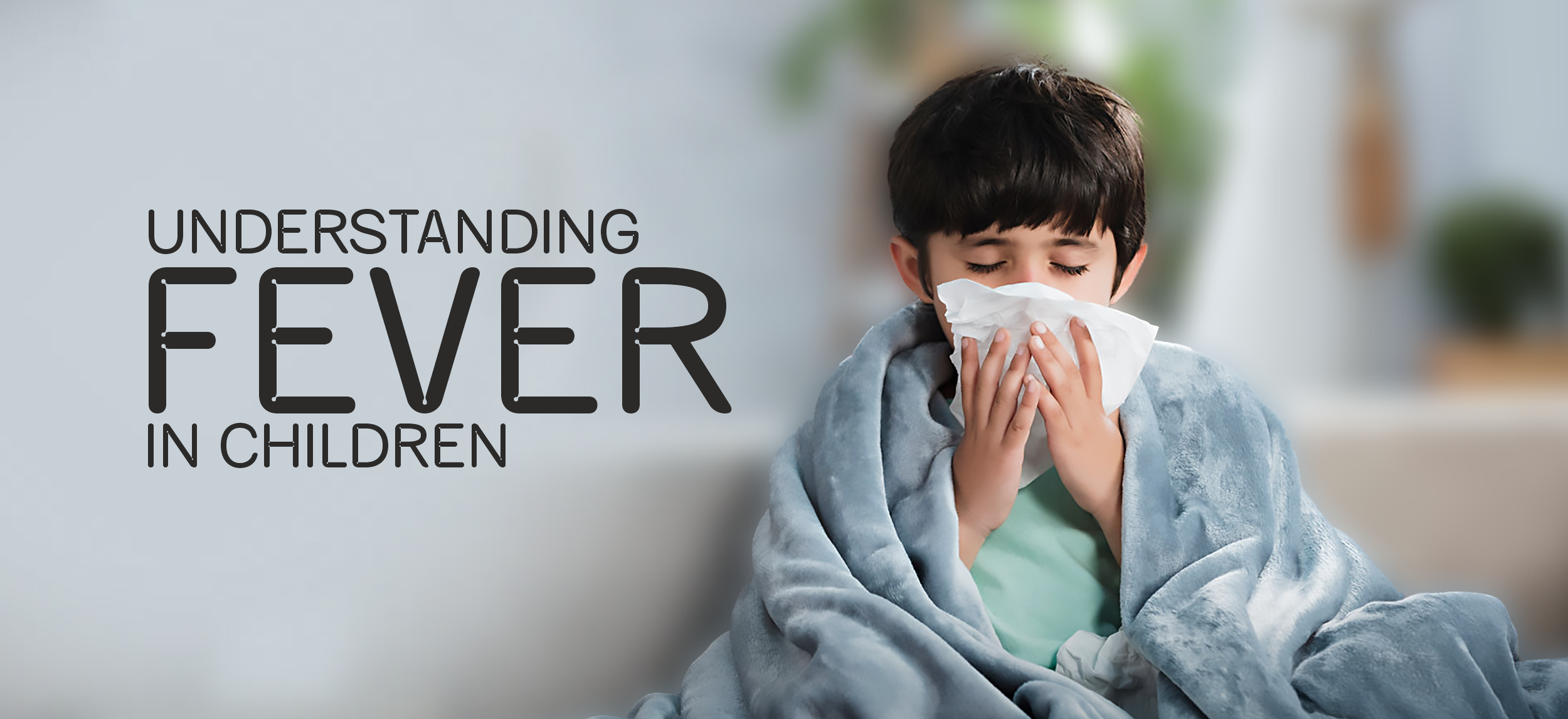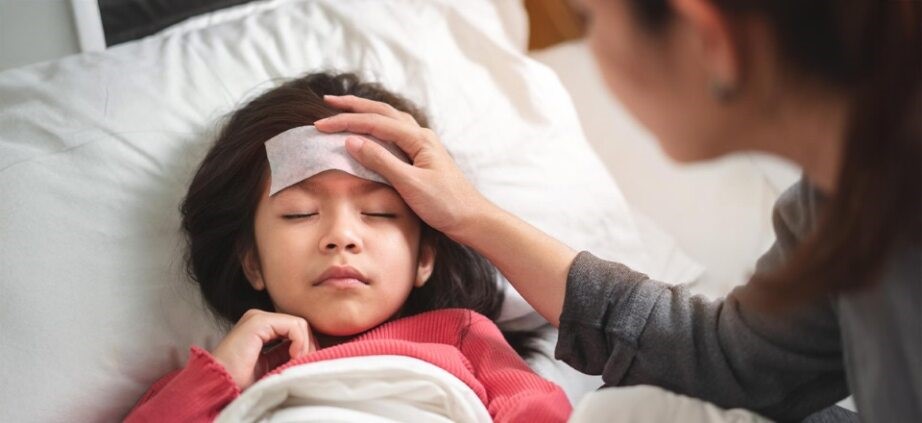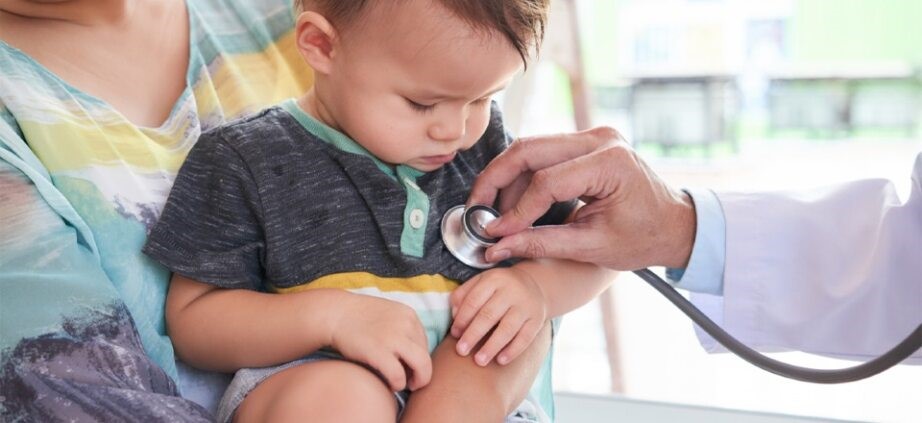Categories
Understanding Fever in Children
Aug 05, 2025
What is a Fever?
A body temperature above the normal range, i.e.,99.6°For higher measured with a thermometer under arm. Fever is not an illness, it's a sign your body is fighting an illness, infection or any injury. It helps activate defenses to destroy the infection.Managing Your Child’s Fever
- Checking Temperature: There are several ways to check your child’s temperature, but the preferred method for young children is under the arm. It’s simple and comfortable for your child.
- Converting Celsius to Fahrenheit: Use the formula:°F=°C × (9/5)+32
Example: Converting 38°C =38× (9/5)+32=100.4°F - Be Cautious with Paracetamol: When your child has a fever, paracetamol is often the first medicine many parents reach for to help reduce their temperature and ease discomfort. However, it’s important to be mindful when giving any medication to your child. Paracetamol comes in various strengths and formulations - such as 125 mg, 250 mg, and 500 mg to suit children of different ages and weights.
Common Causes of Fever in Children
- Viral infections(e.g., colds, flu, gastroenteritis, dengue fever, meningitis)
- Bacterial infections(e.g., ear, eye or skin infections, tonsillitis, urinary tract infections)
- Immunizations(mild fever after vaccines)
- Teething(slight temperature raises)
- Certain medications (side effects)
- Rare conditions (underlying diseases, if any)
- Heat strokes (usually in summer).
Types of Fevers in Children: The Monsoon Impact
Fever in children isanatural responseof many childhood illnesses. It’s the body’s way of fighting off infections. There are severalcauses of fever in children,including below types of fevers in the monsoon season that should be timely diagnosed and treated:-
Dengue
Caused bydengue virus transmitted by the Aedes aegypti (Mosquito-borne viral disease).
Symptoms: High fever | Headache |Rash | Muscle or joint pain |Vomiting | Pain behind eyes | Swollen glands
-
Malaria
Malaria is caused by Plasmodium parasites and transmitted through the bite of infected Anopheles mosquitoes.
Symptoms: High fever |Headache | Nausea & vomiting | Chills | Muscle or joint pain |Fatigue | Abdominal pain | Diarrhoea| Rapid breathing/heart rate
-
Typhoid
Typhoid in children is caused by a Bacteria (Salmonella typhi), through contaminated food and water or close contact with an infected person.
Symptoms: High fever | Headache | Stomach Pain | Constipation or Diarrhoea
-
Chikungunya
Caused by the chikungunya virus transmitted through mosquito bite.
Symptoms: Sudden high fever | Joint Pains and swelling | Muscle Pain | Headache |Tiredness
-
Leptospirosis
Caused byLeptospirabacteria, spread through contaminated water (flood water, especially during the monsoon), soil, or animal urine (rodents).
Symptoms: SuddenHigh fever | Headache | Muscle Pain | Nausea or Vomiting | Red eyes | Abdominal Pain | Constipation or Diarrhoea
Prevention and Care for Fever in Children:
While not all fevers can be prevented, you can reduce the risk of infections that cause fever in children with the following measures:- Drink boiled/filtered water - Stay hydrated
- Maintain hygiene: handwashing, clean clothes
- Keep your home Mosquito-free
- Eliminate stagnant water
- Avoid street food
- Keep your child’s nails trimmed and discourage nail-biting to reduce the risk of infections.
- Stay updated on Vaccinations
- Seek immediate medical attention: If your child exhibits severe symptoms like difficulty breathing, persistent high fever, signs of severe dehydration, seizures or convulsions or unresponsiveness.
Fever in Children: Important Considerations
Though Fever is a common symptom in children, there are times when a fever in children could signal something more serious, and it’s important to know when to seek medical help.- New-borns (under 3 months)with a temperature over100.4°F (38°C)
- New-borns (6 monthsold) with a temperature over102.2°F(39°C)
- High feverlasting more than5 days
- Has a rash, stiff neck, or sensitivity to light
- Feelingdrowsyor unresponsive
- Seizures
- Dehydrated(no tears, dry mouth, fewer wet nappies)
- Flushed, sweaty, or chills/shivering
- Rapid or difficult breathing
- Burning, or frequent urination
Caring for Your Child at Home
- Prefer light, comfortable clothing
- Give plenty of fluids to prevent dehydration.
- Allow rest, but quiet play is fine.
- Don’t take self-medication or antibiotics without a doctor’s advice.











